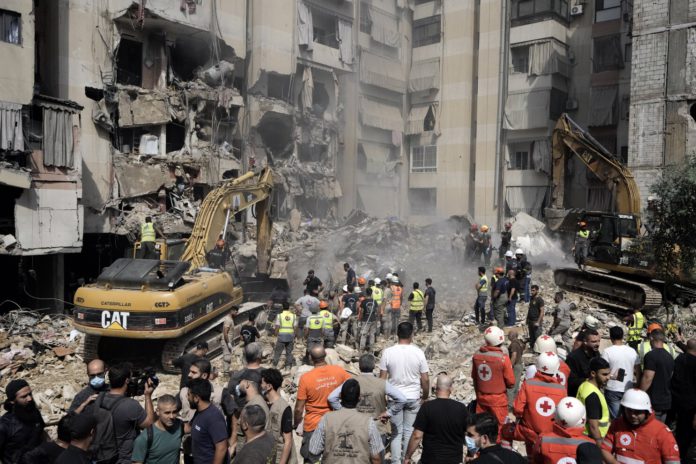The death toll from 115 Israeli airstrikes on various regions in Lebanon rose to 60, the Health Ministry reported on Friday.
Israel conducted attacks across Lebanon on Thursday, the ministry noted, adding the large-scale airstrikes, which started on Monday and have been focused on the south and east of Lebanon, have now spread to include regions in the Mount Lebanon Governorate on its fourth day, Xinhua news agency reported.
As of Thursday, the death toll from the Israel-Hezbollah clashes since October 8, reached 1,540, with injuries totalling 5,410, the ministry added.
In an airstrike on Beirut’s southern suburbs earlier Thursday, at least two people were killed and 15 others injured when a residential building near al-Qaem mosque in Dahieh was hit, according to the Lebanese Health Ministry.
Footage from Lebanese TV channel al-Jadeed showed rescue teams and ambulances rushing to the densely populated area to transport casualties to the hospital and remove victims from beneath the rubble.
Meanwhile, the Israel Defense Forces (IDF) reported that it launched three missiles in “an intelligence-guided attack” on Mohammed Hussein Sarour, commander of Hezbollah’s air unit, claiming he was killed in the strike. The military stated that Sarour was responsible for multiple drone and missile attacks against Israel.
So far, Hezbollah has not commented on the attack nor confirmed Sarour’s death.
Additionally, the IDF announced that its 7th Armored Brigade concluded a military drill a few kilometres from the Lebanese border, simulating a ground operation in Lebanon. The drill trained troops in “manoeuvring and combat in thicketed, mountainous terrain,” the IDF said in a statement, adding that the exercises enhanced their operational and logistical readiness for various combat scenarios in enemy territory on the northern front.
This drill followed a proposal by France at a United Nations Security Council emergency meeting for a 21-day ceasefire in Lebanon, in collaboration with the United States “to allow for negotiations.” Lebanese Prime Minister Najib Mikati welcomed the proposal; however, Israel denied earlier on Thursday that it had agreed to a ceasefire with Hezbollah or Lebanese political parties.
Since Monday, Israel has conducted extensive airstrikes across Lebanon, resulting in over 650 deaths and more than 2,000 injuries.
The Israeli military reported that it has targeted over 2,000 locations during this period. Lebanese Environment Minister Nasser Yassin noted on Wednesday that the bombardment has displaced more than 150,000 residents in the past 72 hours.
This sharp escalation has raised concerns about a potential full-scale conflict between Israel and Lebanon, with fears that other regional powers could also become involved.–




